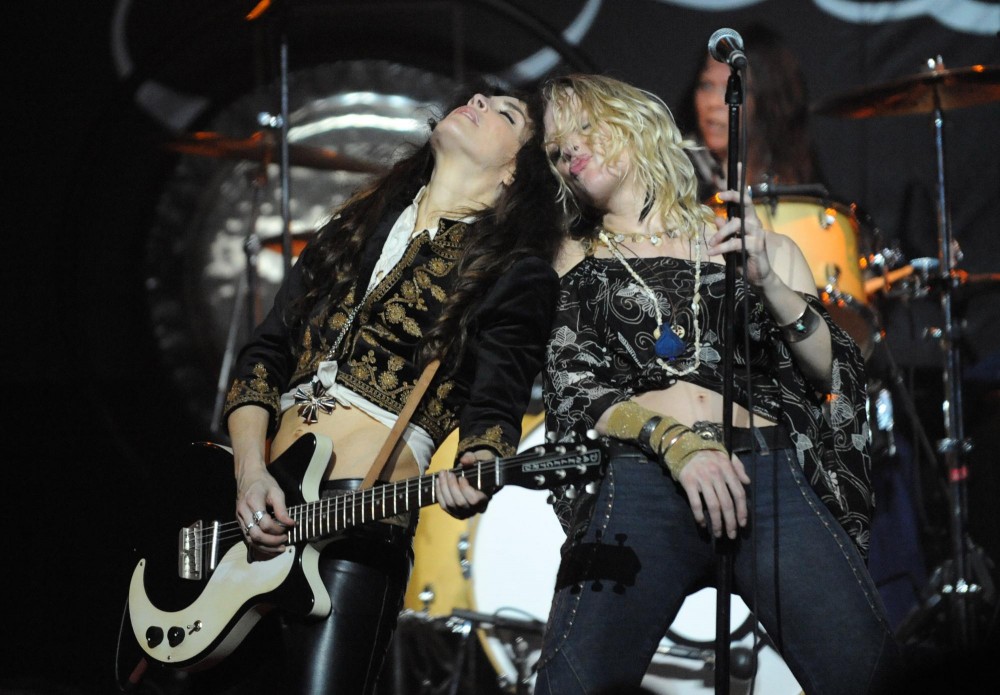What: Lez Zeppelin, Black Rainbow, Thom Chacon
Where: Station 4, 210 E. Fourth St. in St. Paul
When: 8 p.m., March 10
Cost: $15
Ages: 21+
Lez Zeppelin isn’t the first all-female cover band with a kitschy name. Formed in 2004, they joined the ranks of Cheap Chick, AC/DShe, Misstallica and more in a huge tribute band movement led by both men and women.
But Lez Zeppelin stands out as one of the most successful of them all. They’re one of the only Led Zeppelin tributes to have met members of the band and count them as fans. They’ve garnered significant press and name recognition that goes past the wordplay.
And it’s deeper than just being able to sound like Led Zeppelin. The group taps into the sexual politics of their band in a deeper way than their contemporaries, and it sets them apart as something truly special.
A guitarist and music journalist living in New York, Steph Paynes rediscovered Led Zeppelin in the late 1990s and was taken with Jimmy Page’s dynamic and technical guitar playing. Originally, Paynes wouldn’t allow the newly formed Lez Zeppelin to play on a stage for six months. She was all too conscious of the blessing and curse of every tribute band: built-in fans.
“I thought, ‘I’m going to go out there like Jimmy Page and play this shit? I’m going to present myself as one of the great rock guitarists in the world?’ It’s an unbelievably high bar,” Payne said. “It’s great because you’ve got this recognition, but it’s very onerous because you’ve got to live up to it.”
After eight years of painstaking, obsessive study, Paynes is much more comfortable with Page’s guitar work. She, along with the rest of Lez Zeppelin, is interested in the idea of internalizing a great musician.
“I hear it in my own noodling now, I’ve encompassed him into my own playing,” Paynes said. “It’s part of becoming who you are; to take in the great masters.”
But Lez Zeppelin is careful to point out that they never try to imitate the actual look or singing style of Led Zeppelin. Paynes bristles at the tribute band label, preferring to deem the project as something of a “‘she’ incarnation.”
“A tribute band, to me, is really in the business of impersonating another band to try and simulate an experience,” she said. “We’re not really simulating the Led Zeppelin experience as we are capturing the essence of it.”
Since Lez Zeppelin doesn’t get hung up on trying to look like Led Zeppelin, they have the energy and the focus to genuinely sound like them. The band’s intense dedication and level of success has afforded them the producer and the equipment necessary to imitate Zeppelin almost completely.
Last year the women of Lez Zeppelin rerecorded the group’s self-titled debut on all vintage instruments with meticulous attention to detail, and they’re currently working on a rerecording of “Led Zeppelin II.”
Lez Zeppelin’s gender politics are a huge part of what makes them stand out, in a way that goes beyond novelty or some sort of statement that women can rock. It’s the notion of women playing “cock rock” and evoking the same sexuality with which it was originally performed.
“It’s so sensual, so sexual, like Led Zeppelin were. But you can lust after quote-unquote Robert Plant now,” Payne said, referring to Lez Zeppelin vocalist Shannon Conley. “I mean, I think they sort of were anyway, these guys were beautiful. They were very feminine in their macho way, and we’re very macho in our femininity.”
Instead of getting hung up on imitating clothes and lifestyle, Lez Zeppelin is putting emphasis on their sound and how they affect the audience, and they stand out because of it.
“The essence of what Led Zeppelin [was] transcended the notes they were playing. There were all sorts of other things,” Payne said. “I think that those things are magical. You’re dealing with powerful elements.”








